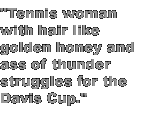The presence of subtitles in anime has generally sparked endless debates among fans and animation industry
insiders alike, but rarely have they piqued scientific curiosity. As all good otaku know, subtitles force a
division of attention between the images on the screen and the text flashing across the bottom. Most favor the
purity of subtitled videos, whereas a few find them distracting and frustrating. Curious as to how the subtitle
effect applies in real life, as well as anime, Akadot staff writer Owen Thomas and I frequented a few preferred
watering holes in the Los Angeles metropolitan region to end the controversy once and for all.
A tepid, late-autumn evening could very well have been right outside the door but the two of us, lip deep into a
glass of Jack and Coke, could hardly notice, entombed as we were in The Lost And Found, a charming little drinking
establishment wedged between a Blockbuster Video (which, by the way, offers an extensive selection of dubbed anime)
and a Toni Maroni's pizza joint (which offers a less expansive selection of dubbed anime). Armed with a sharpie
and a pad of recycled paper we began.
Without a real plan of attack, the two of us started with the most basic of tasks. I spoke to Owen in garbled
Spanish and then proceeded to translate: "Me gusta estar tocando en esa casa de bebiendo," ("I enjoy drinking in
this bar," a poor translation for an even poorer attempt at the Spanish language).
Sort of understanding what I was saying, Owen answered, "Meine namen ist Barbara Brown." (My name is Barbara Brown.")
We had a perfectly pleasant conversation through our translation pad. However we realized that the point of the Live
Action Anime Experiment is to have people in the outside world respond to the anime conventions we've chosen to adopt.
So I took to subtitling Owen and he took to subtitling me in our conversations with other people.
The experiment's shortcomings soon became clear. 1) I speak Spanish, Owen speaks German, making the translations at
best pale simulacrums of our meanings. 2) Further alienating our would-be conversationalists, our atrocious handwriting
at best offered pale simulacrums of the English language (samples of which you can see scattered throughout this column).

We surmounted problem number one quite easily. Wandering around translating into English wasn't so necessary when we spoke
English, those we were speaking to spoke English and nobody's foreign language skills were near good enough to even pretend
otherwise. With the preponderance of DVDs in the marketplace now, which provide the ability to watch the title in English
while simultaneously reading the subtitles, it isn't necessary to test the subtitle theory with a foreign language. And if
we wrote slowly so as to ensure readable text, we'd surmount problem number two as well. Of course, here is where whoever
assumed the role of translator exercised some creative flexibility.
"Yo, homeboy, get off your lazy jobless butt and get me another Reverend Jackie," translated into subtitles as "Buy me
a Jack and Coke please." The colorful embellishments went the other way, too. Mundane statements such as "Anna
Kournikova's not going to win the Davis Cup," became "Tennis woman with hair like golden honey and ass of thunder
struggles for the Davis Cup."
A flippant remark about the earnest, but vacuous, bartender made it through the translator as "The drink man knock knock
at birth, bad father." And admiration for U2 in the wake of their brand new album elicited, "U2 is the band that makes my
soul erect." It became quite clear to us that our beer-guzzling guinea pigs found the disparity between the spoken word and
the subtitle more amusing than the meaning of what was being said.

